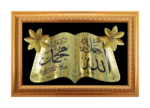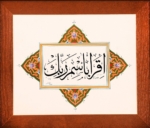“Through the Arabic language, we understand the Quran, and through the Quran, we learn the Islamic laws. Those who do not know Arabic do not know Islam.” |
|
Faithful Muslims are guided by the Holy Quran. |
Therefore, learning Arabic and the Muslim world are closely tied together. Learning classical Arabic for example is mandatory for those wishing to flow the precepts of Muhammad. |
Those who believe in the prophet take courses at the mosque to learn to read Arabic, understand the Quran, and become better Muslims. |
What is classical Arabic? |
The language of the Arab community is nearly 2000 years ld. The Quran was written in the 7th century in a form of ancient Arabic believed to be understood by all Arabic speakers. Quranic Arabic is called literary Arabic. |
Literary Arabic is very similar to Modern standard Arabic (Msa) which is the basis of Arabic script across all Arabic speaking countries. It is used in Arabic writing where the audience is international (in the media, bks, newspapers etc.) |
Literary Arabic is posed to dialectical Arabic in that the latter refers to the dialects spoken in each Arab country. This complicates matters for anyone liking for an Arabic curse as the language spoken across the Middle East and North Africa is different from country to country. |
In other words, Moroccan Arabic (also known as Darija) isn’t the same as Palestinian Arabic, and Iraqi Arabic isn’t the same as Egyptian or Syrian Arabic. |
Aside from the difference in the Arabic pronunciation, there are divergences in grammatical structures, vocabulary, and phrases. |
When it comes to formal written Arabic tuition, the majority of native Arabic speakers living in Muslim countries learn the standard Arabic of Msa that has been modernized for the 20th. |
However, to be able to understand the verses of the Quran, one must learn anther level of ancient classical Arabic, Quranic Arabic. |
Still today, this literary Arabic is used for sacred Islamic texts and liturgies. |
Fortunately, Arabic is a very phonetic (easy to pronounce) language because it contains only fur vowels. |
if all the languages in the world, Arabic is among those with the weakest vowels and the easiest pronunciation. |
The degree to which a language is difficult to pronounce is directly linked to the number of vowels in that language. |
There are eight vowels in Turkish. |
In some European languages, such as English and French, there are more than ten vowel sounds. |
other languages fund elsewhere in the world have more than seven or eight vowels. |
The fur vowels (A, E, I, and U) in Arabic also exist in nearly every other language and are used quite extensively. |
So, an Arabic speaker who wishes to learn anther language and speak well must get used to making a few sounds that don’t exist in Arabic. |
On the other hand, a non-Arabic-speaking person would have on difficulty getting accustomed to Arabic sounds because the sounds used in Arabic are most likely the principal sounds used in his or her own language. |
When we consider that non-Arabic speaking Muslims must recite the Quran in its original language, it is clear that Arabic must be rather easy for them to learn and why Arabic is considered a universal language. |
Taking courses in Quranic and literary Arabic can help learners achieve the following vital gals: |
improving oral communication in one of the world’s most beautiful languages
|
discovering the origin of their first name in Arabic
|
learning the Arabic alphabet
|
learning Arabic grammar in order to write in Arabic
|
extending knowledge of Arabic words
|
learning Arabic calligraphy
|
exploring Arabic poetry through pets like Avicenna.
|
receiving a high-quality Islamic education
|
practicing the art of tajwid, improving Quranic recitation
|
|
|
Achieving your gals is simple. Just head on over to your nearest mosque and inquire about Arabic language classes and Islamic training. |
Is the mosque too far away? |
Then, try online Arabic lessons. They’re yours for the taking! |



